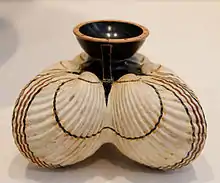Aryballos
An aryballos (Greek: ἀρύβαλλος; plural aryballoi) was a small spherical or globular flask with a narrow neck used in Ancient Greece.[1][2] It was used to contain perfume or oil, and is often depicted in vase paintings being used by athletes during bathing. In these depictions, the vessel is at times attached by a strap to the athlete's wrist, or hung by a strap from a peg on the wall.

The shape of the aryballos originally came from the oinochoe of the Geometric period of the 9th century BCE, a globe-shaped wine jar. By the Proto-Corinthian period of the following century, it had attained its definitive shape, going from spherical to ovoid to conical, and finally back to spherical. This definitive form has a wide, flat mouth, and a single small handle. Some later variations have bell-shaped mouths, a second handle, and/or a flat base. Potters also created inventive shapes for aryballoi. The Austrian commission of the Corpus Vasorum Antiquorum is investigating the material properties of these vessels using Computed Tomography and optical 3D acquisition techniques.[3]
Gallery

 Owl-shaped, Proto-Corinthian, 630 BC
Owl-shaped, Proto-Corinthian, 630 BC 575–550 BC (Louvre)
575–550 BC (Louvre)
 Janiform with kalos inscription, 520 BC
Janiform with kalos inscription, 520 BC Foot-shaped, c. 500 BC
Foot-shaped, c. 500 BC Hand-shaped, Hunt Museum
Hand-shaped, Hunt Museum
 Ancient Etruscan "aryballoi" terracotta vessels unearthed in the 1860s at Bolzhaya Bliznitsa tumulus near Phanagoria, South Russia (then part of the Bosporan Kingdom of Cimmerian Bosporus); on exhibit at the Hermitage Museum in Saint Petersburg.
Ancient Etruscan "aryballoi" terracotta vessels unearthed in the 1860s at Bolzhaya Bliznitsa tumulus near Phanagoria, South Russia (then part of the Bosporan Kingdom of Cimmerian Bosporus); on exhibit at the Hermitage Museum in Saint Petersburg.
References
- "aryballos" in The New Encyclopædia Britannica. Chicago: Encyclopædia Britannica Inc., 15th edn., 1992, Vol. 1, p. 611.
- Shanks, Michael (1999). Art and the Greek City State. United Kingdom: Cambridge University Press. pp. 50–52. ISBN 0 521 56117 5.
- Stephan Karl, Paul Bayer, Hubert Mara and András Márton (2019), "Advanced Documentation Methods in Studying Corinthian Black-figure Vase Painting" (PDF), Proceedings of the 23rd International Conference on Cultural Heritage and New Technologies (CHNT23), Vienna, Austria, ISBN 978-3-200-06576-5, retrieved 2020-01-09CS1 maint: multiple names: authors list (link)
- From the workshop of the Douris Painter. On the back two kalós love-inscriptions declare that Thodis and Chairippos are handsome. Exhibited in Room 8 of the Kerameikos Archaeological Museum (Athens).
External links
| Wikimedia Commons has media related to Aryballoi. |
- Advanced documentation methods in studying Corinthian black-figure vase painting on YouTube showing a Computed Tomography scan and rollout of the aryballos No. G26, archaeological collection, Graz University. The video was rendered using the GigaMesh Software Framework, cf. doi:10.11588/heidok.00025189.